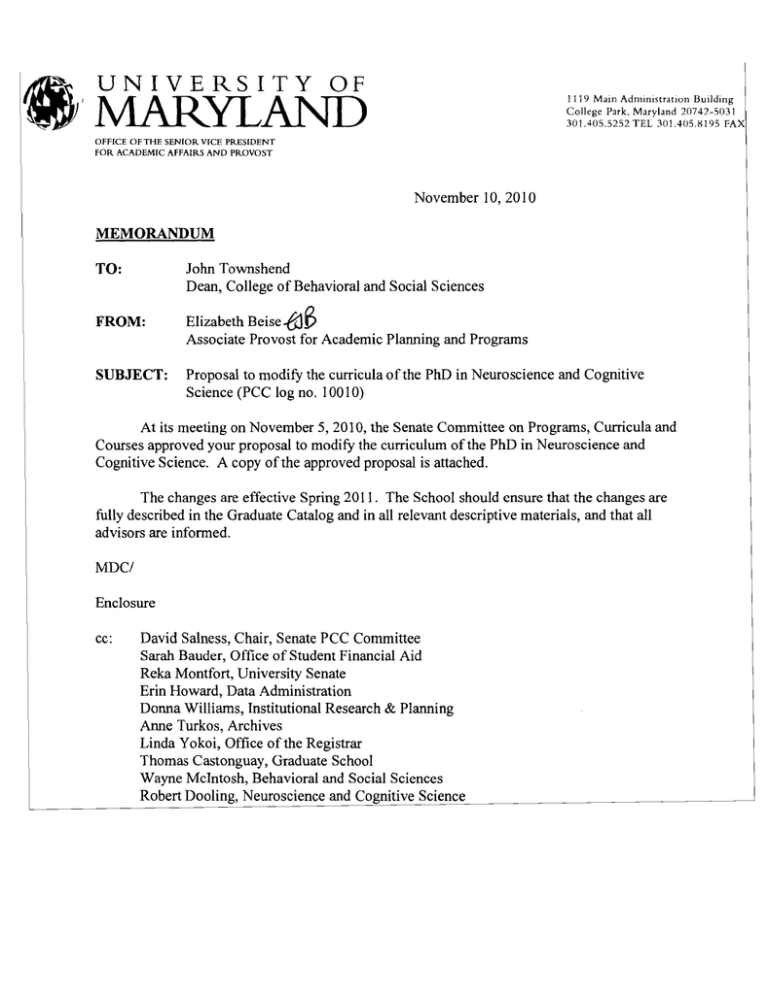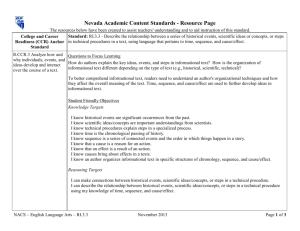MARYLAND A .. _~I UNIVERSITY OF
advertisement

A .. _~I UNIVERSITY OF MARYLAND 1119 Main Administration Building College Park, Maryland 20742-5031 301.405.5252 TEL 301.405.8195 FAX OFFICE OF THE SENIOR VICE PRESIDENT FOR ACADEMIC AFFAIRS AND PROVOST November 10, 2010 MEMORANDUM TO: John Townshend Dean, College of Behavioral and Social Sciences FROM: Elizabeth Beise-6::lB Associate Provost for Academic Planning and Programs SUBJECT: Proposal to modify the curricula of the PhD in Neuroscience and Cognitive Science (PCC log no. 10010) At its meeting on November 5, 2010, the Senate Committee on Programs, Curricula and Courses approved your proposal to modify the curriculum of the PhD in Neuroscience and Cognitive Science. A copy of the approved proposal is attached. The changes are effective Spring 2011. The School should ensure that the changes are fully described in the Graduate Catalog and in all relevant descriptive materials, and that all advisors are informed. MDC/ Enclosure cc: David Salness, Chair, Senate PCC Committee Sarah Bauder, Office of Student Financial Aid Reka Montfort, University Senate Erin Howard, Data Administration Donna Williams, Institutional Research & Planning Anne Turkos, Archives Linda Yokoi, Office of the Registrar Thomas Castonguay, Graduate School Wayne McIntosh, Behavioral and Social Sciences Robert Dooling, Neuroscience and Cognitive Science THE UNIVERSITY OF MARYLAND, COLLEGE PARK PROGRAM/CURRICULUMIUNIT PROPOSAL I • Please email the rest of the proposal as an MSWord attachment to pcc-submissions@umd.edu. • Please submit the signed form to the Office of the Associate Provost for Academic Planning and Programs, 1119 Main Administration Building, Campus. PCC LOG NO. 10 0 1 0 _ College/School: College/School Unit Code-First 8 digits: Unit Codes can befound at: https://hypprod.umd.edu/Html Reports/units.htm DepartmentIProgram: DepartmentIProgram Unit code-Last 7 digits: Type of Action (choose one): x Curriculum change (including informal specializations) o Renaming ofprogram or formal Area ofConcentration o Addition/deletion offormal Area ofConcentration 0 New academic degree/award program IJ New Professional Studies award iteration 0 New Minor IJ Other Suspend/delete program Italics indicate that the proposed program action must be presented to the full University Senate for consideration. [j Summary of Proposed Action: We propose that the curriculum for the NACS program be changed to include formal training in computational neuroscience (NACS643), cellular and molecular neuroscience (NACS644), cognitive science, (NACS645), and ethics in scientific research (NACS600). We also request that the course title for NACS642 be changed from "Cognitive and Computational Neuroscience" to "Cognitive Neuroscience," that the course number for NACS728Y be changed to NACS645, and that NACS618 be deleted from the curriculum. APPROVAL SIGNATURES - Please print name, sign, an ·tionallines for multi-unit programs. 1. Department Committee Chair _Cynthia Mos~s~~,-e,~~~~-=--.-:::~=2. Department Chair "3/ / IA ~=.t.1~~L~""+':-..'::<.J-=- _ _Robert Dooling --=--"-~<:fI~~""",,,-,o<..---=-T-+----_._'J---'-----r!<--_c--_---- 4. Dean 6. Chair, Senate PCC __bL---""",,,---¥-..J£..!oL..-~>,,---=-=--="'--------------~'.--f-'-""'----f----!...loL---7. University Senate Chair (if required) ------r-.(Jr-h----------------------­ 8. Vice ""'sident fo' Academk Affa.... & Prov"" U111iJt, 1'1'f-'txu~=-~""'------( -J\/,---fO--j/r-- 2fJ O _ _ _ _ ' 1: _.', ...: , ",: - ) - ' Proposal Requirement #1 1. Current (old) requirements. As shown in the catalog, plus additional materials, if any, prepared by the Department or College and distributed to current students. NACS Program Page 11 6 Degree requirements 6.1 Philosophy A major strength of the NACS program is the broad, integrative training it offers graduate students. An important goal of the curriculum is to assure that all NACS students have a core body of knowledge covering the basic concepts across the full range of the neural and cognitive sciences. This must be balanced with a second goal: a doctorate in NACS is a research degree, and the best way to learn the skills and strategies of research is to be immersed in day-to-day laboratory or research group activities and an independent project. Thus, the program should impose the smallest number of required courses consistent with the sufficient breadth of training. 6.2 Course requirements 6.2.1 Core NACS 641 Biological basis of neuroscience NACS 642 Cognitive and computational neuroscience NACS 618 Classic papers in neuroscience (two semesters) A scientific ethics course Note: There are plans to offer NACS643, Computational Neuroscience, when faculty resources become available. Students who have satisfactorily completed graduate courses with comparable content can be exempted from NACS 641, 642, 643 and/or the ethics course with written permission of their committee and the Graduate Director. This includes students with prior training in neural, cognitive and/or computational neuroscience and students entering the NACS Program with a Master's degree in a related field. 6.2.2 Supplemental Each NACS student must complete three courses (minimum of 9 credits) chosen from the NACS course list (see NACS website: http://www.life.umd.edu/nacs). These courses should be selected with advice from the student's committee. The student's advisory committee may require course work to remedy any areas of weakness in the student's previous training. 6.2.3 NAC~ course Jist This is a list prepared by the Curriculum Committee and updated every year. It is not an aI/­ inclusive list of neural and cognitive science courses, but rather a list of courses recommended for pre-candidacy graduate students. see NACS website: http://www.life.umd.edu/nacs Proposal Requirement #2 2. 5 Proposed (new) requirements. (Please also check that the requirements are consistent with the regulations specific to the type of certificate or degree.) Degree Requirements 5.1 Philosophy A major strength of the NACS program is the broad, integrative training it offers graduate students. An important goal of the curriculum is to assure that all NACS students have a core body of knowledge covering the basic concepts across the full range of neuroscience and cognitive science. This must be balanced with a second goal: a doctorate in NACS is a research degree, and the best way to learn the skills and strategies of research is to be immersed in day-to-day laboratory or research group activities and an independent project. Thus, the program should impose the smallest number of required courses consistent with the sufficient breadth of training. 5.2 Course requirements 5.2.1 Core NACS 600 Ethics in Scientific Research NACS 641 Introduction to Neuroscience Three of the following courses: NACS 642 Cognitive Neuroscience NACS 643 Computational Neuroscience NACS 644 Cellular and Molecular Neuroscience NACS 645f728Y Introduction to Cognitive Science • Students who have satisfactorily completed graduate courses with comparable content can be exempted from NACS 600, 641, 642, 643, 644, and 645 core course requirements with written permission of their committee and the Graduate Director. This includes students with prior training in neural, cognitive, and/or computational neuroscience and students entering the NACS Program with a Master's degree in a related field. 5.2.2 Supplemental • In addition to the core courses, NACS students must complete three courses (minimum of 9 credits) that are relevant to their program of research. These courses should be approved by the student's committee. Credits from core courses beyond the three mandated will count toward the total of 9 credits. • The student's advisory committee may require additional course work to remedy any areas of weakness in the student's previous training. • The Graduate School requires 12 credits of 899 dissertation research credits before graduation. Students must be registered for at least one credit during the semester they intend to graduate. IMPORTANT: This includes summer sessions. A student who intends to graduate in summer or winter term must be registered for 1 credit during that term. Weblink: www.nacs.umd.edu/program/coursedesc/coursenumber.html. 5.2.3 NACS course list • This is a list of NACS-related courses that are taught by NACS faculty. A list of current NACS course offerings can be found on our website: http://www.nacs.umd.edu/program/coursedesc/coursenumber.html. Proposal Requirement #3 3. Identification of and rationale for the changes. The Neuroscience and Cognitive Science (NACS) Program is a campus-wide Ph.D. program involving faculty from eight College Park colleges (Agriculture and Natural Resources, Arts and Humanities, Behavioral and Social Sciences, Chemical and Life Sciences, Computer Math and Physical Sciences, Education, Engineering, School of Public Health) and more than a dozen departments (Animal and Avian Sciences, Biology, Bioengineering, Computer Science, Electrical and Computer Engineering, English, Entomology, Food and Nutrition, Hearing and Speech, Human Development, Kinesiology, Linguistics, Philosophy, Psychology). For a list of NACS graduate students, their home departments, and participating faculty, see Appendix C. The NACS Program was approved by MHEC in 1996, and the structure of graduate training was piloted in the first years of the Program. The course requirements of the approved program included the following: • • • NACS 641: Introduction to Neuroscience NACS 642: Cognitive and Computational Neuroscience NACS 618: Classics in Neuroscience and Cognitive Science As the NACS Program grew in both faculty and students, the need was recognized to offer formal training in additional areas: Computational Neuroscience, Cellular and Molecular Neuroscience, Cognitive Science, and Ethics. Core courses in these areas were added, and the NACS curriculum committee proposed changes to the NACS Program requirements in 2006. These requirements were discussed by the NACS faculty and approved in a vote at the spring meeting of 2006. The approved and current NACS program core curriculum appears below: • • Required courses o NACS600 (Ethics in Scientific Research)* o NACS641 Three of the remaining four core courses o NACS642 o NACS643 (Computational Neuroscience) o NACS644 (Cellular and Molecular Neuroscience) o NACS728Y (Introduction to Cognitive Science) *Many of the NACS graduate students are supported by research and training grants, which now require training in the responsible conduct of research (RCR). We offer our students such a course, NACS 600, Ethics in Scientific Research, which is required of all NACS graduate students. NACS 600 is cross-listed as Biology 600 and Psychology 788B. Demand is so high for this course that two sections are offered each spring semester. It only came to the attention of the NACS administration very recently that the course requirements approved by the NACS faculty in 2006 were not submitted to the campus for review. We regret this oversight and are now submitting this proposal to request formal approval of the courses requirements in the NACS interdisciplinary graduate training program. Proposal Reqwrement #4 4. A sample program under the proposed requirements. Show how a typical student would progress through the proposed program year by year. Attention should be paid to course prerequisites to ensure that students can actually follow the prescribed program. A table illustrating the semester by semester breakdown of credits is useful. Year One Fall: Spring: Year Two Fall: Spring: NACS641: Introduction to Neuroscience (4 credits); no prerequisite First of 3 supplement courses (3-4 credits) NACS600: Ethics in Scientific Research (2 credits); no prerequisite NACS642: Cognitive Neuroscience (4 credits); prerequisite NACS641 or permission of instructor NACS728Y: Introduction to Cognitive Science (4 credits); no prerequisite Second supplemental course (3-4 credits) NACS643: Computational Neuroscience (4 credits); prerequisite NACS641 or permission of instructor Third supplemental course (3-4 credits) Year Three Pass Qualifying Exam Year Four Pass Dissertation Proposal Defense and Advance to Candidacy Year Five Pass Dissertation Defense Proposal Requirement #5 5. A list, table or chart showing the prerequisite structure of all required or optional courses appearing in the new requirements. It may also be helpful to provide a table illustrating a sample schedule of course offerings, semester by semester, to demonstrate that, with the available and anticipated faculty, enough courses will initially be offered to allow students to progress through their programs. The schedule should allow time for the necessary development of new courses. Note: NACS core courses are offered every year in the fall or spring semester. Fall semester NACS641: Introduction to Neuroscience (4 credits); no prerequisite Detailed examination of neuroanatomy, neurophysiology, neural development and plasticity, sensory processing, motor control, and 'higher' CNS (Cognitive & Neural Science) functions such as language and memory NACS728Y: Introduction to Cognitive Science (4 credits); no prerequisite This course provides a high-level introduction to the study of mental representations and computations. The following issues are examined: computation, representations, decisions, modularity, evolution, innateness, and reductionism. An integral part of the course is writing small "thought papers" discussing the reading for the day. Spring semester NACS600: Ethics in Scientific Research (2 credits); at least one year of doctoral studies, permission of instructor Required of all NACS students. This class is a discussion and seminar of important topics dealing with how to do scientific research. Topics include mentoring, data ownership, animal and human subjects, peer review, publication, inventions and patents, etc. NACS642: Cognitive Neuroscience (4 credits); prerequisite NACS641 or permission of instructor A study of the fundamental concepts and techniques of cognitive neuroscience. Recurring themes in the field such as face recognition, learning, and language are examined. NACS643: Computational Neuroscience (4 credits); prerequisite NACS641 or permission of instructor Provides a mathematical foundation in computational neuroscience. Use of a computer with MATLAB will be required for the homework assignments. NACS644: Cellular and Molecular Neuroscience (4 credits); prerequisite NACS641 or permission of instructor Overview of recent insights into the molecular mechanisms underlying the structure and function of the nervous system, including the molecular machinery subserving neuronal function, intracellular signaling cascades initiated by synaptic activation, and synaptic plasticity. In addition, we examine the techniques employed to gain these insights. Proposal Requirement #8 6. A list of any new courses: prefix, number, title, credits. New courses that have not yet been approved need not have specific numbers, but should be identified according to the desired level, such as 3..... ·Selected· or ·Special" topics courses should be avoided. If courses to be offered regularly in the new program are presently offered as "Selected" or "Special" topics, you should propose to make them pennanent. Indicate new courses with an X. Indicate current courses that will be substantially modified as part of the program change with an M. Include a copy of the VPAC infonnation describing these new or modified courses. It is your responsibility to insure that the new or modified course proposals are submitted for VPAC approval in a timely fashion. Courses to add to the Curriculum NACS600: Ethics in Scientific Research (2 credits) NACS643: Computational Neuroscience (4 credits) NACS644: Cellular and Molecular Neuroscience (4 credits) NACS645: Introduction to Cognitive Science (4 credits) NACS645 has not been formally assigned this course number yet and is currently listed as NACS728Y. As part of this proposal, we are requesting that NACS645 numbering be approved by the PCC as a permanent course. Course Title Change As part of this proposal, we are also requesting that the title of NACS642, an already approved core course, be changed from Cognitive and Computational Neuroscience to Cognitive Neuroscience. The Curriculum we are using and would like to be approved: Required courses: NACS600: Ethics in Scientific Research NACS641: Introduction to Neuroscience Three of the following courses: NACS642: Cognitive Neuroscience NACS643: Computational Neuroscience NACS644: Cellular and Molecular Neuroscience NACS645: Introduction to Cognitive Science Proposal Requirement #7 7. A list of the courses being deleted from the program requirements. Core Course to be Deleted NACS618: Classics in Neuroscience and Cognitive Science NACS 618 was proposed as a seminar that would review and critique classic papers in the field. The faculty member who taught this course left the University of Maryland, and unfortunately the resources for the program have not permitted hiring a replacement. This course has not been taught since 2003 and it has not been required of NACS students since it has not been offered. Proposal Requirement #a 8. Letters from any department(s) whose courses will be required or otherwise impacted. If the change in curriculum introduces a requirement (or recommendation) that majors take a course offered by another department, it is important to establish that such a requirement will not unduly burden faculty and resources elsewhere on campus. Attach a memorandum or letter from the Chair of the affected department indicating that it can handle the additional enrollment that the curriculum change will generate. This requirement does not apply to our proposal. Our requested curriculum change will not impact other departments. Proposal Requirement #9 9. It should be specifically acknowledged that students enrolled in the program prior to the effective date of any curriculum change may complete their program under the old requirements if they wish. The courses required must remain available, or suitable substitutions specifically designated. Further, if the proposed curriculum change affects articulation or transfer programs, the proposal should explain how currently-enrolled community college students will be able to complete their projected programs. Any necessary modifications to articulation agreements should be attached. Students enrolled in the NACS program prior to the effective date of this curriculum change may complete their program under the old requirements if they wish.



